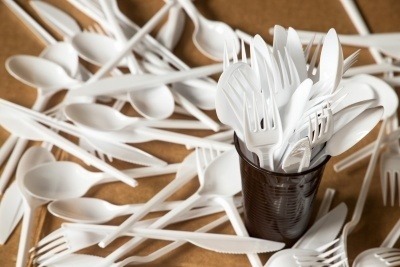England’s latest single-use plastics ban explained
New regulations from Defra banning the sale of several single-use plastic products came into effect in England on 1 October 2023.
 The single-use plastic ban targets plates, bowls, trays, cutlery and balloon sticks made from plastics, as well as ready-to-eat food and drink containers made from extruded or expanded polystyrene (EPS or XPS). The regulations prohibit the sale of these materials both online and over the counter even if the products are made from biodegradable, compostable or recycled plastics and affect items made both completely and partly from plastic.
The single-use plastic ban targets plates, bowls, trays, cutlery and balloon sticks made from plastics, as well as ready-to-eat food and drink containers made from extruded or expanded polystyrene (EPS or XPS). The regulations prohibit the sale of these materials both online and over the counter even if the products are made from biodegradable, compostable or recycled plastics and affect items made both completely and partly from plastic.
According to Defra: ‘England uses 2.7 billion items of single-use cutlery – most of which are plastic – and 721 million single-use plates per year, but only 10 per cent are recycled.’
There are several exemptions from the ban:
- Single-use plastic plates, bowls and trays can still be sold by one business to another;
- Single-use plastic plates, bowls and trays can still be sold to consumers as long as they are used as packaging at the point of sale;
- Polystyrene containers that are made without foaming are not banned;
- And polystyrene containers holding food that requires further preparation such as the addition of water, microwaving or toasting.
The government recommended providers used up their stock of restricted items before 1 October and switch to either reusable or non-plastic alternatives. Existing alternatives include wooden cutlery; plant-fibre and cardboard plates, bowls and trays; cardboard takeaway boxes; and paper balloon sticks.
The restrictions were confirmed by Defra on 14 January 2023. They were decided on after a 12-week consultation period between November 2021 and February 2022.
Environment Minister Rebecca Pow said: “This new ban is the next big step in our mission to crack down on harmful plastic waste. It will protect the environment and help to cut litter – stopping plastic pollution dirtying our streets and threatening our wildlife.”
Enforcement of the single-use plastic bans
Any business that continues to provide disposable single-use plastic items after 1 October could be fined, regardless of whether the items are new or existing stock left over from before the ban.
Inspections will be carried out by local authorities to make sure the new rules are being followed. Inspectors will have the power to visit shops and stores, make test purchases, speak to staff, and ask to see records. If a business is found to be breaking the law, the business can be ordered to cover the cost of the investigation.
The penalty amounts in England have not yet been announced, but in Scotland, failure to comply with the regulations carries a maximum fine of £5,000.
Fines can be appealed within 28 days of receiving them. If a business can show it did everything it reasonably could to avoid breaking the rules, this could be accepted as a reasonable defence.
Defra encourages any businesses with questions about the restrictions to contact [email protected].
What other single-use plastic bans are in effect?
Some other plastic products are already banned in England: in May 2019, bans came into effect for plastic-stemmed cotton buds, straws and stirrers, and in 2018 the use of microplastic beads in cosmetic and personal care products was banned outright.
The carrier bag charge, introduced in October 2015 and raised from five to ten pence in May 2021, has cut single-use plastic bag sales ‘by over 97 per cent in main supermarkets’ according to Defra.
Single-use plastic plates, bowls, trays, cutlery, balloon sticks and ready-to-eat food and drink containers made with EPS or XPS are already banned in the EU and have been since 3 July 2021. The EU ban also applies to products made of oxo-degradable plastics, a type of plastic that can break down rapidly into smaller particles but does not break down on the polymer level. Oxo-degrading products form microplastics rapidly, but there is no evidence of them breaking down in the natural environment any faster than conventional plastics. They are yet to be banned in England.
In Wales restrictions similar to those now introduced in England include a second phase (which will begin to come into force from 2024 onwards) banning single-use plastic carrier bags, polystyrene lids for cups and take-away food containers, and oxo-degradable plastic products.
Are there any other plastic bans on the horizon?
During the 12-week consultation period on the new restrictions, Defra also called for evidence on other forms of plastic pollution, including wet wipes, tobacco filters, sachets, cigarette filters and single-use cups. No announcements have been made so far around the restriction of these products from this consultation.
However, wet wipes are now set to be banned in 2024 as part of the new ‘Plan for Water’ in order to reduce pollution and improve water quality in England.
There have also been calls to ban single-use vaping products in the UK over sustainability and childhood vaping concerns. 









